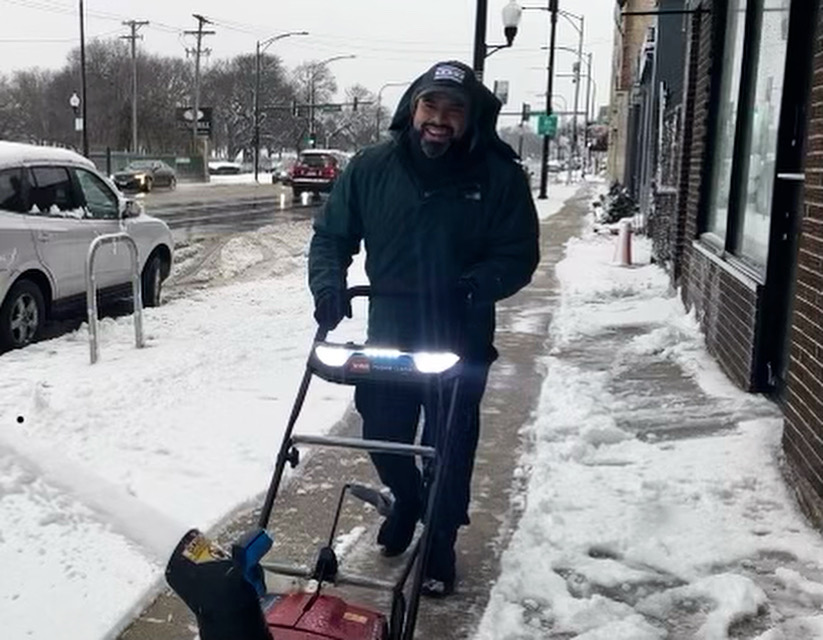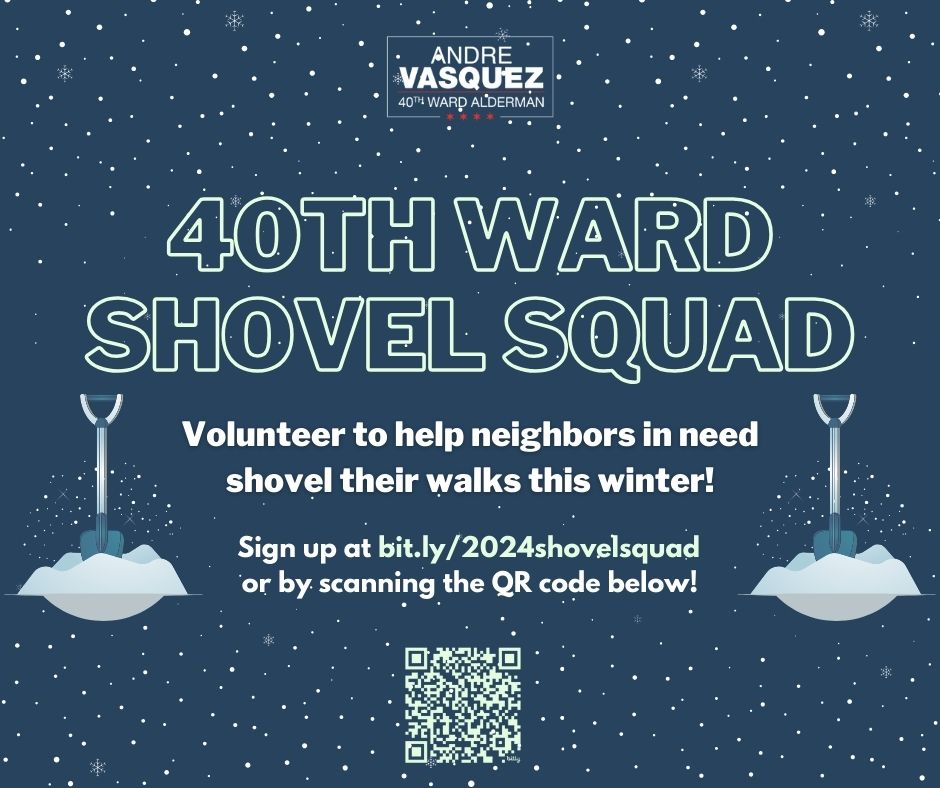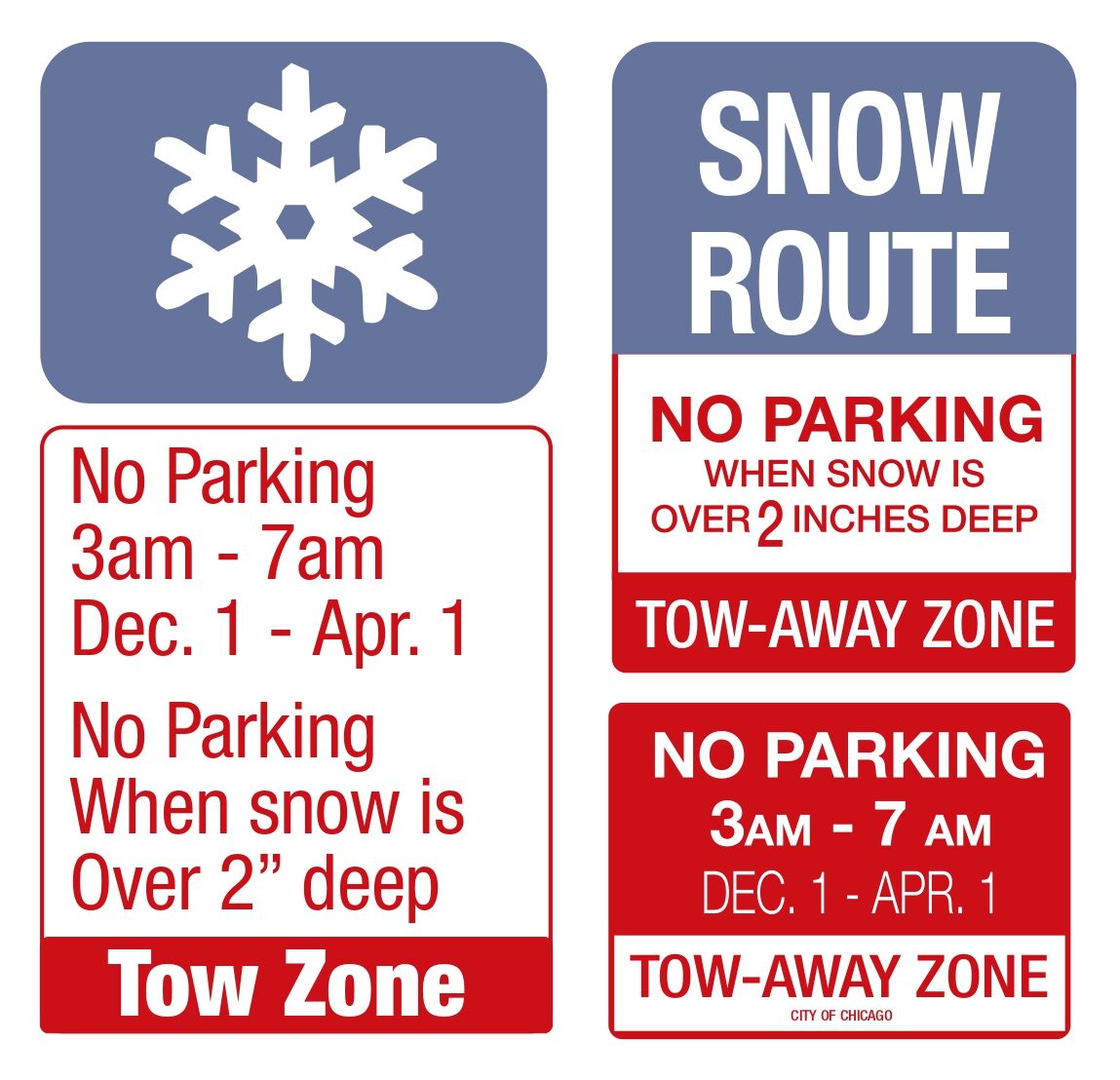
Cold weather has arrived! Here’s everything you need to know to prepare for this winter.
Snow Removal
The Department of Streets & Sanitation (DSS) coordinates Chicago’s snow and ice control efforts from Snow Command, and you can see when and where snow plows are active using the city’s Plow Tracker tool. When it snows, DSS’s first priority is to clear arterial streets (e.g. Foster, Damen, or Lincoln Ave). Once arterial streets are deemed safe, Snow Command takes care of residential streets.
A couple of things to note:
- The city does not plow alleys, because plowed snow can accumulate against garages and can cause structural damage or collapse. Instead of plowing, DSS sends garbage trucks down alleys to compress the snow, making alleys easier to navigate. If you’d like your alley to be plowed, we recommend organizing your block to pay for snow removal services.
- Bridge sidewalks and bike lanes require special snow equipment, and cannot be plowed by typical snow plows. To request snow removal, please file a Snow Removal – Protected Bike Lane or Bridge Sidewalk service request via 311. Please note that CDOT has limited capacity to prioritize these requests, so snow removal may take longer than usual. Reach out to our ward office if snow isn’t removed within 72 hours after the stated completion time on 311.
- Sidewalks are not currently cleared by the city; Chicagoans must clear a path at least 5 feet wide on all sidewalks adjacent to your property, including any crosswalk ramps. They should not shovel the snow into the right-of-way, which includes: transit stops, bus pads, parking spaces, bike lanes, bike racks, Divvy stations, and any other space where snow impedes traffic. If you notice a sidewalk in the public way that has not been shoveled or salted within 15 hours after a snow event, please file a Snow – Uncleared Sidewalk Complaint via 311. You can also contact our office, so we can submit a 311 request and then escalate to our Ward Superintendent, who has the authority to issue tickets. Our Ward office prioritizes ticketing businesses / apartment complexes, instead of single family residences.

In the 40th Ward, we also have a program called the Shovel Squad, which pairs volunteers with a senior neighbors and folks with disabilities who are unable to shovel their walks. We dispatch shoveling volunteers when snowfall is 2 inches or more, or when conditions are particularly treacherous. We still need volunteers, so if you can commit to partnering with just one household to shovel their walks throughout the Winter season, sign up here! You can also see more details on our Volunteer Opportunities page.
Snow Parking Bans
Also remember that when it snows, parking bans will take effect on arterial streets! The Chicago winter overnight parking ban begins on Sunday, December 1, 2024 (overnight Thursday-Friday), and is in effect through April 1st, 2025. The parking ban is enforced regardless of snow on main streets throughout the City during the hours of 3-7AM. Foster and Ridge Avenue are the only streets within the 40th Ward to which the parking ban applies, but you can see a full map of affected streets here.
There is a separate snow-related parking ban that can be activated regardless of date on arterial streets where there are at least two inches of snow on the ground! While it isn’t activated often, cars parked on these street may receive a ticket to facilitate snow removal. Affected streets will be marked with signs like the one below:

Staying Warm During Extreme Cold
Remember that you have a right to stay warm! The Chicago Heat Ordinance mandates that during cold weather months, landlords supply heat to rental units or to any unit where owners do not have individual control of the heat. From September 15th through June 1st, the temperature inside a rental residence is required to be at least 68 degrees from 8:30 AM to 10:30 PM and at least 66 degrees from 10:30 PM to 8:30 AM. Landlords face fines of up to $1000 per day, per violation, for each day they do not supply adequate heat. The reason for lack of heat does not matter – landlords must follow the law, and apartments must be heated.
If your apartment is insufficiently heated, please file a No Heat Complaint via 311. The Department of Buildings (DOB) will inspect your unit and will take action against delinquent owners. Another resource is he Chicago Tenants Movement who can help counsel tenants and inform them of their rights around winter issues. The hotline is 773-657-8700. They may be able to donate an indoor thermometer to tenants so they can more effectively report complaints to 311 (while supplies last).
When temperatures are at 32 degrees or below, warming areas are also available at the City’s six community service centers from 9 a.m. to 5 p.m., Monday through Friday. The warming areas are available for all residents in need of safe refuge and relief from extreme cold weather. Learn more at the city’s website.
Here are some other cold weather tips from the Office of Emergency Management and Communications:
- Drivers should take extra precautions to winterize their vehicles and have necessary supplies in their car, including cell-phone chargers;
- Avoid unnecessary trips outdoors, and limit the time you stay outside;
- Wear several layers of loose, warm clothing. The drier you can stay, the better! Moisture can damage the insulating effectiveness of your clothes.
- Keep your head, hands, and feet covered when outdoors, and familiarize yourself with the signs of frostbite.
- Pay extra attention to your daily needs: make sure you’re getting enough sleep, eat high-energy food, and drink warm beverages to stay warm (and avoid alcohol beverages if you’ll be spending a lot of time in the cold weather).
For more details, visit Chicago.gov/OEMC.

Here are some other safety tips to keep in mind this winter:
- Keep your tailpipe clear when shoveling out your car. When you’re clearing snow from your car, start in the back and move forward, and take extra care to ensure that your tailpipe is clear of snow. A clogged tailpipe can have lethal consequences, by forcing carbon monoxide into the car.
- Keep power equipment clear and contact ComEd in the event of an outage. In order to avoid losing power, please make sure not inadvertently bury your ComEd transformers and/or switchgear under snow! In the event of a power outage, contact ComEd immediately by texting OUT to 26633 (COMED) or calling 1-800 EDISON1 (1-800-334-7661).
- Check your phone or the television or radio for the weather. Make sure you’re informed so you can plan ahead for any major snow events!
- Make sure you stock up for any large snowstorms. Plan ahead by keeping a supply of shelf stable food that does not require cooking, such as cereal, crackers, tuna, nuts, dried fruit, canned goods, and water. If you normally get 30 days of medication, request larger supplies (e.g., 90 days) or look into having medication mailed to you. Make sure you have extra blankets, flashlights, and extra batteries.
- Make sure your carbon monoxide and fire detector are working. Don’t forget to stock up and batteries as well!
- In times of extreme cold, leave your water taps slightly open. Leaving a constant drip of water will protect your pipes against freezing.
Stay warm this winter! As always, you can contact the 40th Ward office at 773-654-1867 or submit a constituent request if there’s anything we can help with.